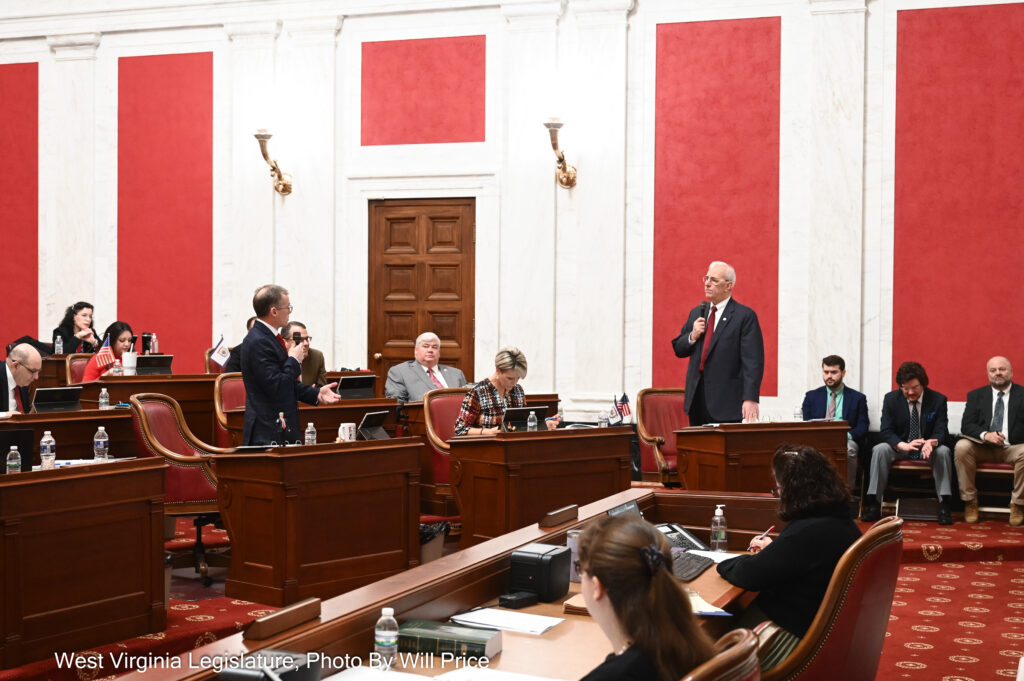The Senate considered bills Friday on welfare programs, the Crown Act, oil and gas taxes, and a bill that would affect West Virginia Public Broadcasting.
The Crown Act, a bill that would prohibit racial discrimination based on certain hair textures and hairstyles, hit the Senate floor Friday.
Sen. Charles Trump, R-Morgan, is a sponsor of Senate Bill 496 and the chair of the Senate Judiciary Committee. The committee approved the bill Thursday evening following testimony from Veronica Clay-Bunch, Miss Black West Virginia.
“Whenever it comes to wearing ethnic hairstyles, sometimes we do tend to have issues with being discriminated against,” Clay-Bunch said.
The bill was read for the first time and then debate erupted.
Sen. Eric Tarr, R-Putnam, asked for the bill to be sent to the Senate Finance Committee, which he chairs. He indicated he was concerned there might be costs associated with the bill that had not been discussed.
Trump asked for evidence of the fiscal implications, and then opposed the motion to send the bill to the Finance Committee. He said it was unnecessary for the bill to go to Finance, because the bill would not increase expenses to the state.
“In fact, I think this bill, if we pass it will reduce, has a chance to reduce expenses to the state,” Trump said.
He reiterated that it is already illegal to discriminate against someone because of race in the state.
“This bill simply clarifies that if you discriminate against someone because of his or her hairstyle associated with his or her race, it qualifies as racial discrimination,” Trump said.
Sen. Mike Caputo, D-Marion, said the bill passed the Senate four years ago without a fiscal note.
“I don’t know what the motive is for moving this bill to Finance this late in the session, but I can certainly anticipate what the motive is,” Caputo said.
The Senate voted 22-12 to send the bill to the Finance Committee.
All bills have to be out of committee by Sunday, Feb. 25 to have a chance at making it across the finish line.
Senate Bill 562 expands job training requirements for Supplemental Nutrition Assistance Program (SNAP) recipients.
West Virginia has the second lowest labor participation rate in the United States, behind Mississippi.
Sen. Rollan Roberts, R-Raleigh, lead sponsor of the bill, said it would address multigenerational dependence on welfare.
“I would describe this legislation as in this bill as a compassionately structured three year plan designed to gradually wean able-bodied adults without dependent children off of SNAP benefits,” Roberts said.
There is no fiscal note on the bill. Roberts said that counties can fund these programs using opioid settlement funds.
Caputo asked for the bill to be sent to Finance. Tarr opposed the motion.
“I can’t believe what I’m hearing, quite frankly,” Caputo said.
Caputo and Tarr debated why one bill was getting a fiscal note, and another bill that would involve programs that require some form of funding was not going to the Finance Committee. Ultimately, the bill was passed by the Senate without Caputo’s motion and heads to the House for consideration.
Senate Bill 844 would directly affect West Virginia Public Broadcasting. It changes the name of the oversight committee from the Educational Broadcasting Authority to Educational Broadcasting Commission. But it also shifts the ability to select the executive director to the secretary of Arts, Culture and History.
Caputo read a letter from a constituent urging him to vote no.
“It happens to come from two of my constituents who happen to be pretty large donors to the public broadcasting system. Now, I’m not going to mention their names, but, ‘I’m writing in hopes that you will vote against Senate Bill 844. This bill will fundamentally change public broadcasting by changing it to a state commission. West Virginia Public Broadcasting is funded by donations, of which my husband and I contribute generously, and bequests. Our donations are specifically for the independent journalism provided by WVPB. We’re not going to be supporters if our donations are simply to a state commission, which can be raided by a future governor to fund other pet projects,’” Caputo read.
The bill was passed by the Senate and heads to the House for consideration.






















